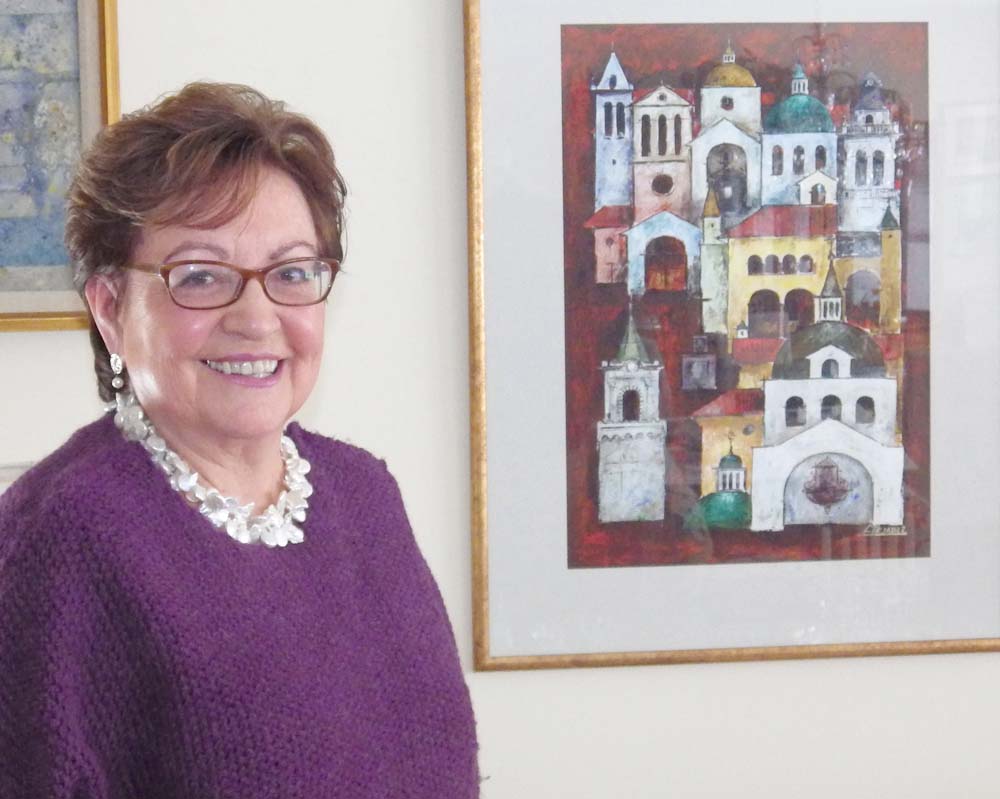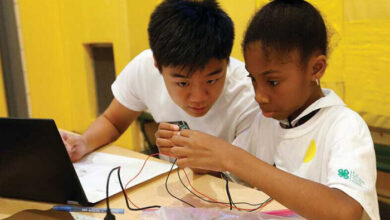Alicia Fink: Leader, educator, and artist serving locally and in her birthplace Ecuador

Alicia Fink lives a comfortable life in the Town of Sweden. She has pursued her jewelry design for a decade as a retired teacher. She is president of the Western Monroe Historical Society in Brockport, ending a productive four-year term in May. Alicia’s husband of 46 years is Herb Fink, Ph.D. in Psychology at The College at Brockport. They enjoy the social and cultural benefits of a quiet college town.
Behind this tranquil setting are Alicia’s stories of leaving her comfort zone to improve the lives of other people. With determination and grit she restored a school in her homeland of Ecuador, and also searched for the hidden women poets of Ecuador to publish their work. Alicia’s strong sense of purpose in Ecuador is also found in the educational and career path she set for herself in this country.
Restoring a school in Ecuador.
Alicia grew up in Quito, Ecuador’s capital. She was a member of a middle class family who were typically architects, educators, artists, landowners, and manufacturers.
She left Quito for the U.S. after high school graduation in 1959 and did not return for 16 years. Then she made only short visits. Four years ago an aunt in Quito asked Alicia to visit the struggling school nearby. “The school was built on the grounds where my grandfather’s farm used to be near Tupigachi,” Alicia said. “As kids, we used to spend our summers there. We grew up with the farm workers’ families.” Eventually, the natives bought the farm from her grandfather by raising money in their commune. A hamlet was formed with a school of 150 students in grades K through 7 at the center of the commune.
When Alicia visited the school, “They had nothing,” she said. “There were old beat up tables and everything was thrown on the floor. The principal had been there 15 years and did not have a desk or a computer.”
Alicia’s shock led to enterprising action. First, to engage the children and get their books off the ground, they would make shelves out of bricks and boards. Then, after a week in Quito asking for donations, her uncles, friends, and others started offering their stored-away desks and chairs. And, a cousin bought a lap top computer for the principal. “Two weeks after my first visit, I went back with five pickup trucks and a big rental truck full of furniture,” Alicia said.
As the locals unloaded the trucks, “Everybody was crying to see all these things coming to the school,” Alicia said. “The principal’s hands were shaking as he received the lap top.” She left it to the principal to distribute what had been delivered. “I went back two weeks later, and I was crying because it was a different school. Everything was clean; nothing on the floor, and the children had learned to be organized.”
Alicia’s smaller projects also helped the school and delighted the children. She purchased: School supplies with a Brockport Lions Club donation; a swing set and slide with money from Brockport friends, plus her own contribution; and, 20 mattresses and sheets for each of the pre-school children with her own funds.
In January 2016, Alicia will return to the school with Dr. Laura Lieberman and ten students from The College at Brockport to develop a physical education curriculum that is completely lacking now.
An anthology of poetry by Ecuador women
For over 28 years, retiring in 1999, Alicia’s career was teaching Spanish in Hilton High School. In 1990 she quotes a student in Advanced Spanish as saying, “You are always talking about women, reading poetry, and telling us about Ecuador. But you never read a poem by a woman from Ecuador.” She promised to do so. Finding no such poetry, she called a Ph.D. friend and poet at Miami University of Ohio to seek help. After he could find no Ecuadorian women poets either, she vowed to him, “I am going to find them and we are going to translate and publish their poetry.” So began her seven-year odyssey back and forth to scour Ecuador in search of women poets.
Going beyond her familiar territory, “I did not know anybody,” Alicia said. But, the country was so small and the people so open, she added, many were reached through word of mouth. “It was amazing how these women came with their poems, many written on scrap paper or in note-books. It was as if they were carrying their babies and handing them over to me.”
In 1997, she and her friend selected out poems and published a small bi-lingual anthology. There were many writers, but only a few were included for lack of money. She explained, “Men in Ecuador had the money and controlled the whole publishing industry. So, men were published but not women.”
“It was one of the more fascinating things I have done because it put me in contact not only with the women but with men who were writers,” Alicia said about her seven-year adventure. “This broadened my horizons beyond family and friends I knew in Ecuador.”
In her adopted homeland
Alicia’s achievements in this country show the same sense of purpose and drive seen in her Ecuador projects. After graduating with many privileged young people from Ecuador’s American School in 1959, she started in a woman’s college in St. Louis. She went with the guidance of her father who sought her intellectual development as well as social status, Alicia said. Shunning the affected atmosphere on campus, she quit after two years. In a cultural turnabout, she spent two years in St. Louis ghettos as a welfare worker. To her shocked father, she said, “I love what I am doing. The experience has totally changed me.”
Eventually, Alicia followed her life’s dream of being a teacher, graduating from the University of New Mexico with certification to teach her native Spanish as well as her newly-mastered French. Immediately after graduation, she accepted a position to teach Spanish in the Peace Corps/College Degree Program at The College at Brockport. It was there she met Herb Fink and they soon started married life in Brockport. During her 28-year career in teaching Spanish at Hilton High School, Alicia wrote several guides for teaching communicative competence in foreign languages.
Following a long line of recognized artists and musicians in her family, Alicia has discovered her own artistic talent in jewelry design. Ten years ago in retirement, “I realized I might reach 80, having spent my life in my night gown reading,” she reflected with a smile. At the time she was attracted to a workshop in jewelry design with a revolutionary Precious Metal Clay (PMC) from Japan. She has worked with the material ever since and is certified by the PMC organization. In a crowning satisfaction at this stage in life, her desire to teach now includes her jewelry making classes in area Continuing Education Programs, at the Rochester Memorial Art Gallery, Studio 34 in Rochester, and in her studio.




